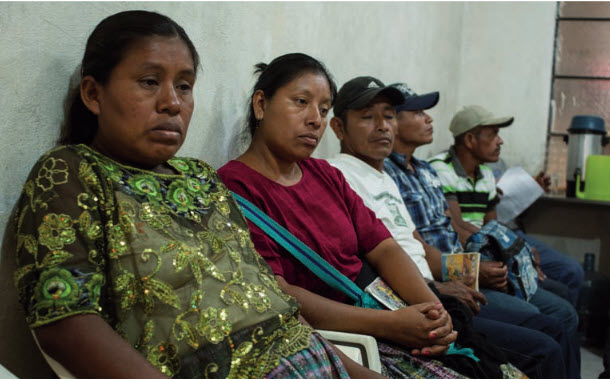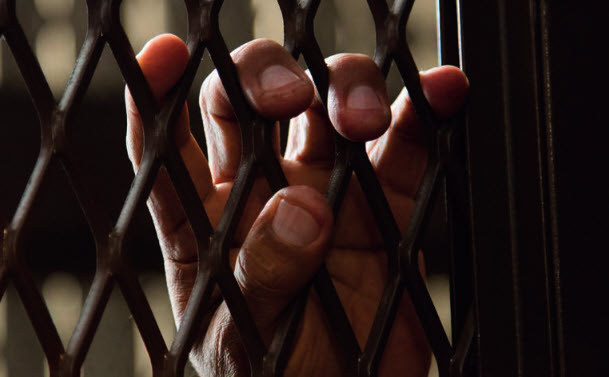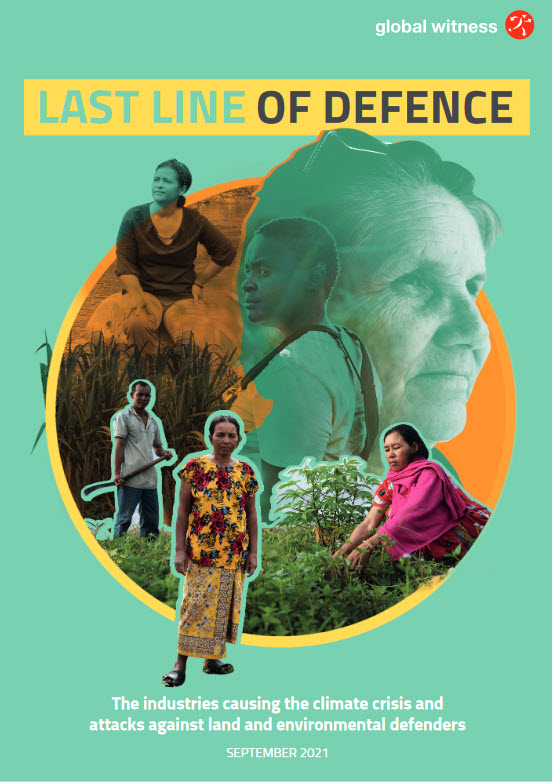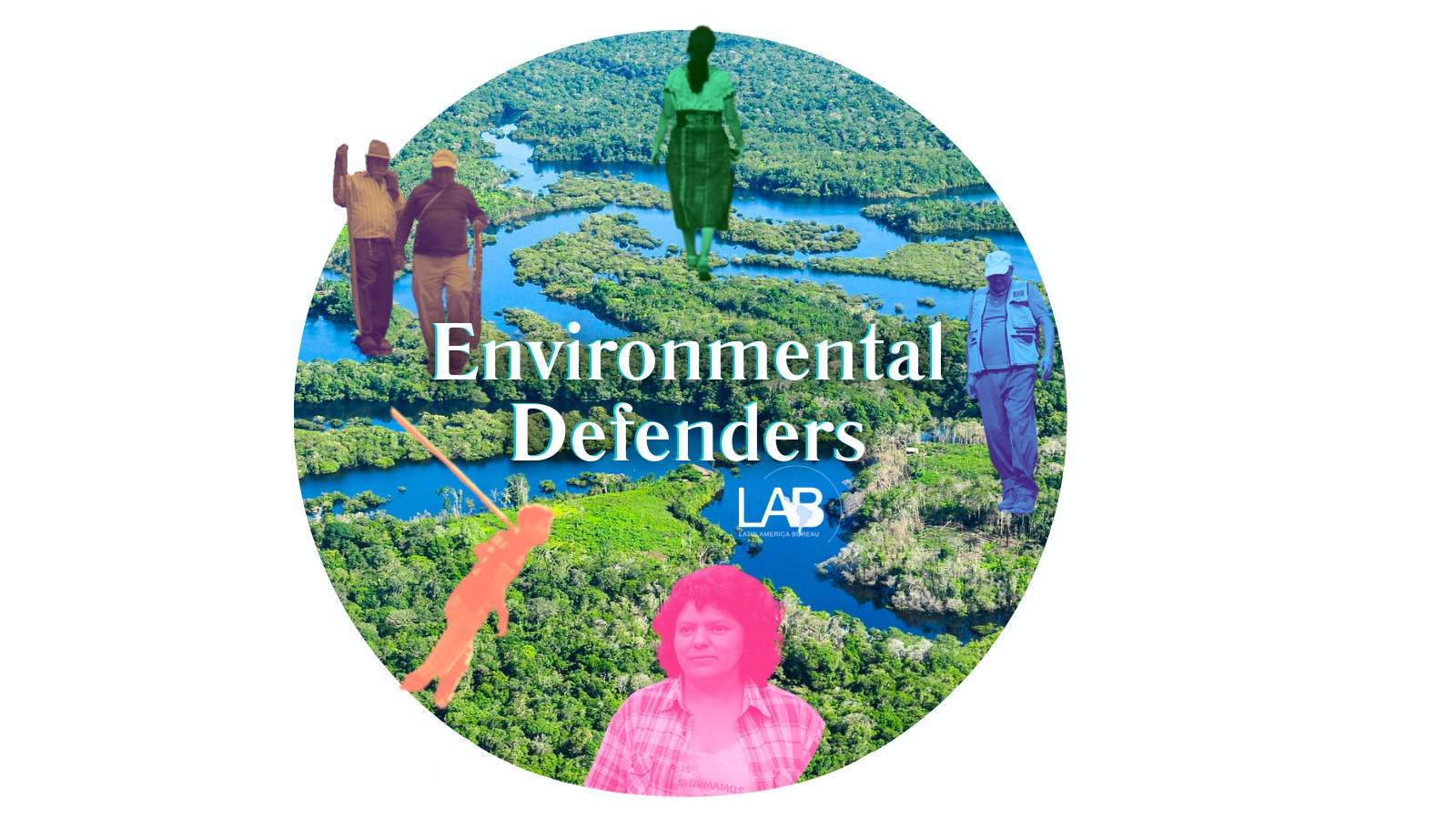This article is part of LAB’s new Blog Series, Environmental Defenders, inspired by the Global Witness report highlighting the terrible toll of killings of those who seek to defend their rights to land, water and their own way of life. The series is curated and edited by Katie Jones.
Other posts in the series can be seen here. Each new post will be released initially to LAB ‘patrons’ (paying subscribers), but will later be made available in full to all visitors to LAB’s website.
When Abelino Chub Caal, of the Q’eqchi Maya community in Guatemala, attempted to mediate between his community and two agribusiness companies in February 2017, he was accused of aggravated trespass, arson and illicit association, and was then arrested. During his trial in April 2019, he was able to provide evidence that he was not in the area at the time the alleged crimes took place, and all charges against him were dismissed. According to Global Witness, the companies had been attempting to move from banana to palm oil cultivation on ancestral Q’eqchi land without consulting the community.
In Guatemala, the State has criminalised land defenders in a bid to silence and intimidate them. In 2020, this small country saw the world’s fourth highest number of environmental defender killings per capita, with 13 people murdered for defending the environment, out of a population of 16.6 million, according to recent data published by Global Witness.
The nation’s Protection Unit for Human Rights Defenders (La Unidad de Protección a Defensoras y Defensores de Derechos Humanos – UDEFEGUA) found that those most targeted by violence between 2000 and 2015 were those working to protect Indigenous rights and the environment, according to a 2016 Amnesty International report.
Violent evictions
Criminalisation, Abelino told Global Witness, is one of the tactics employed by the State to silence those who speak out against ‘forced evictions, land grabs and environmental damage from dams, mines and palm oil plantations.’
‘In 2011, I witnessed some ruthless evictions by the police of 732 Q’eqchi Indigenous families from their land in the Polochic Valley, which was later planted with sugar crops for biofuels. One person died, several were injured and hundreds displaced from their homes. Their shacks and crops were burnt down.’
Following these evictions, the offices of the Guillermo Toriello Foundation where Abelino works were broken into and devices storing crucial information were stolen. Abelino and his colleagues believe this was a punishment for providing support to the evicted families.
He added that he was not against business in the area, and that he would be supportive of ethical companies respecting Indigenous rights and work to protect the environment.
As Guatemala’s economic model is dependent on raw material extraction and land ownership is concentrated in the hands of the wealthy, criminalisation of community activists still continues. In turn, this enables big business to profit from the land while tearing apart communities and destroying ecosystems. Indigenous communities have been particularly targeted. The nation’s 1996 peace agreement aimed to resolve causes of land conflict, as well as the discrimination and marginalisation faced by Indigenous communities. In practice, however, agreements like this have not been fulfilled.
Slow progress
Some progress has been made in halting extractive projects in Guatemala, compelling companies to mitigate practices that are harmful to the environment, or at least stopping the persecution of environmental defenders.
One community was able after years of campaigning to get the license of a large gold mine suspended by the nation’s Supreme Court. According to Amnesty International, from 2011, in the municipalities of San José del Golfo and San Pedro Ayampuc, in southern Guatemala, the La Puya Peaceful Resistance group fought to revoke the license of a gold mine belonging to Exploraciones Mineras de Guatemala S.A. (EXMINGUA), a subsidiary of the US company Kappes, Cassidy and Associates.
After the group had spent five years campaigning, the Supreme Court ‘temporarily suspended’ the mine’s operating license, as it had not respected the right to prior consultation. The Ministry of Energy and Mines contested this, saying that the license had already been granted and could not be revoked. In response, members of the La Puya group staged sit-in protests at the Ministry building, calling for ‘interim relief granted by the Court to be enforced’.
In two further cases, it took intervention from the Inter-American Human Rights Commission (IACHR) to force the government to take responsibility for communities that had been put in jeopardy by extractive activities.
In 1996, exploration for the Marlin Mine was commenced in the municipality of San Miguel Ixtahuacán by the Montana Exploradora de Guatemala S.A., a subsidiary of Canadian mining company Goldcorp. On 7 July 2010 a woman named Diodora Hernández was shot at in the nearby village of San José Nueva Esperanza, after she refused to sell her land. As a result, she lost the sight in one eye. Her attempts to secure justice have so far been frustrated. However, IACHR requested that the State take precautions to ensure that 18 communities had access to water ‘safe for drinking, domestic use and irrigation’.

Meanwhile Amnesty International reports that in 2011, more than 700 Q’eqchi families who demanded access to land in the Valley of Polochic, in the Alta Verapaz department, were subjected to mass evictions, and, consequently, left without anywhere to live or grow crops. IACHR intervened once again, ordering Guatemala’s government to provide food and shelter for these families. The response was inadequate. In 2013, some families were given land, but the vast majority were left with none. Some 500 families ended up returning to land from which they had previously been evicted. Another attempt was made to evict them in 2016, but this was overturned. In June of that year, the government promised to provide farms where they could settle and, a month later, a farm for 82 families was due to be handed over, Amnesty International revealed.
In Guatemala, the military is often used to carry out so-called ‘public security operations’. According to the Inter-American Commission on Human Rights (IACHR), nine Special Reserve Army Squads for Citizen Security were created in 2015 to support the police during these operations. These squads have been deployed in the capital and neighbouring municipalities, as well as in the departments of San Marcos, Quetzaltenango, Huehuetenango, Quiché, Zacapa, Chiquimula and Izabal, and Indigenous territories. These areas have repeatedly seen social conflict linked to extraction projects. The government has also declared a State of Emergency in these areas. This use of the military to violently suppress rural populations carries unpleasant echoes Guatemala’s violent past.
New wave of violence in El Estor
During the pandemic, Front Line Defenders and UDEFEGUA have expressed alarm over further incidents of violence against the Q’eqchi Maya community, the fishing community and journalists working to defend land, water and human rights in the El Estor municipality, located in the eastern Izabal department.
Mining projects have historically been linked to human rights abuses in El Estor. In 2007, as Abelino Chub Caal told Global Witness, a Canadian mining company, Hudbay Minerales, that owns Compañía Guatemalteca de Níquel (CGN), violently evicted members of the Q’eqchi’ community in the municipality. Eleven Q’eqchi’ Mayan women said they were sexually abused by private security personnel employed by Skye Resources Inc., which now forms part of Hudbay Minerals.
In late September 2009, human rights defender Adolfo Ich Chamán was killed at the mine by private security personnel. Adolfo was part of the Lote 8 community and was working with other communities to protect their lands from Hudbay Minerals operations. The human rights defender Germán Chub Choc also suffered life-changing injuries from the same attack. Both cases remain unpunished.
More recently, in early October of this year, the Q’eqchi Maya Ancestral Council set up a protest camp, 10 kilometres away from the CGN’s processing plant. There, they demanded respect for their rights and compliance with the Constitutional Court’s judgement. During the 20 days the protest lasted, they were joined by different organisations and communities. According to reports from local organisations, on 21 and 22 October 2021, police used tear gas that affected those living in houses at the entrance of the municipality.
Days later, as a response to the protests, President Alejandro Giammattei declared a State of Siege and a curfew in El Estor for thirty days. The situation escalated further when, on 27 October, a contingent of armed security forces working under the government broke into the homes of the human rights defender and widow of Adolfo Ich Chamán, Angélica Choc, and her son, Luis Adolfo Ich Choc. The same day, the house of Germán Chub Choc was also raided by police. He was ‘surprised while sleeping’ and not permitted to use his wheelchair. Angélica Choc and Germán Chub Choc are still working to bring a case against Hudbay Minerals in relation to the killing of Adolfo and the shooting of Germán by the security staff.
Recommendations
Front Line Defenders and UDEFEGUA have called on the Guatemalan State to abstain from acts of repression and hostility against those who are defending their right to consultation. The organisations urge the adoption of effective processes that recognise how the work of human rights defenders and journalists contributes to the country’s democracy. They also demand that police brutality against defenders, protestors, their families, and people who are exercising legitimate journalistic work is condemned.
Meanwhile, Global Witness recommends that the government declares any legislation designed to criminalise protectors null and void. Further, the organisation adds that any company carrying out business activity must carry out mandatory due diligence with respect to environmental and human rights protections, and that corporate actors should face punishment if they are found to have been implicated in acts of violence against defenders.
Any response to ongoing abuses based on these deeper structural inequalities must centre around the voices of Indigenous communities and those risking their lives to save the environment.
Main image: Imprisoned human rights defender from northern Huehuetenango, Guatemala City, Guatemala, 6 July 2016.
@Amnesty International / Anaïs Taracena



